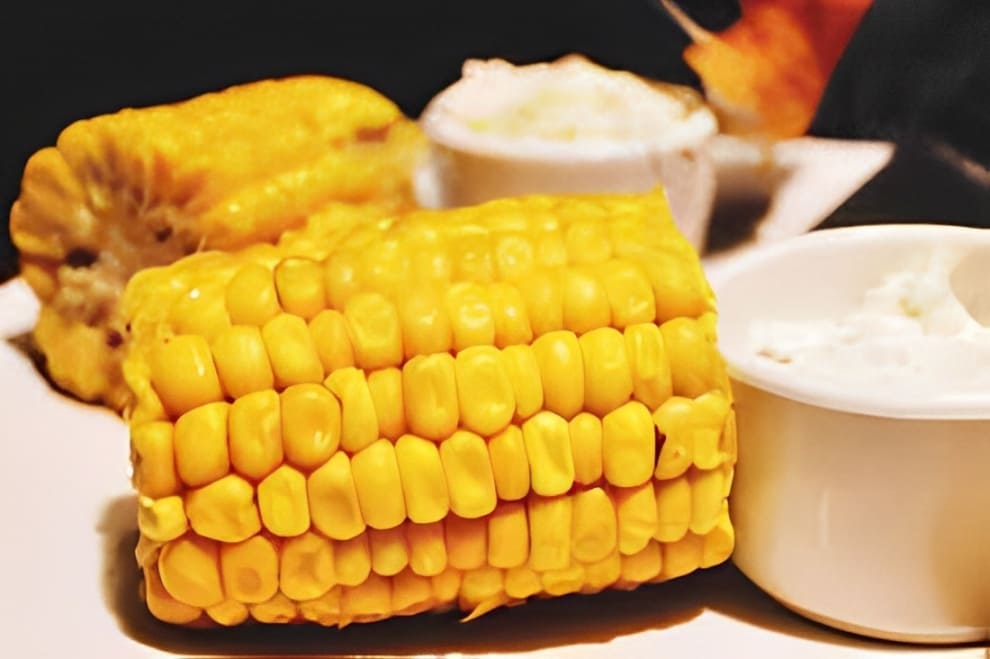
Pregnancy changes your eating habits. Every bite matters. You want food that tastes good and supports your growing baby. Corn is a common craving during pregnancy. Its sweet taste and versatility make it a favorite. Corn is a favorite for many mothers. But can you eat corn during your pregnancy? Is it the right choice? Let’s explore its benefits, risks, nutritional facts, and safe ways to enjoy corn during pregnancy.
Table of Contents
Is Corn Safe to Eat During Pregnancy
Yes, corn is safe for most pregnant women. It’s a whole grain and starchy vegetable with important nutrients like fiber, folate, vitamin B6, and magnesium. These nutrients support digestion, energy, and healthy fetal development. The key is how you prepare it. Fresh corn or homemade dishes are best. Processed corn products like chips, corn syrup, or sweetened cereals should be limited.
Is Corn Good or Bad During Pregnancy? Let’s Look at the Facts
Corn can be a nutritious part of your diet. According to the USDA, one cup of cooked corn has about 134 calories, 3.6 grams of protein, 2.9 grams of fiber, and 88 micrograms of folate. That’s nearly 22% of your daily folate needs during pregnancy. Folate helps prevent neural tube defects in the first trimester. This makes corn a smart early-pregnancy choice.
Real-Life Example: Corn Helped in the First Trimester
In early pregnancy, I battled strong morning sickness. Many foods made me nauseous. But steamed sweet corn with lemon and a trace of salt always felt comfortable. It was mild on the stomach, easy to eat, and kept me from feeling hungry. For many women, corn becomes a go-to snack when appetite fades.
Does Corn Help with Pregnancy Digestion?
Yes, corn does support digestion. It’s rich in dietary fiber, which eases constipation—an issue affecting about 38% of pregnant women, according to research published in Obstetrics & Gynecology. If you’re new to fiber, start slow. Large portions of corn may cause gas or bloating.
What Are the Health Benefits of Eating Corn During Pregnancy?

Corn offers multiple benefits throughout pregnancy. Folate is essential for a baby’s early brain and spinal cord development, and corn is a great source of it. This makes corn especially valuable during the first trimester. As pregnancy progresses, corn continues to provide essential B vitamins that help support your metabolism and reduce feelings of fatigue.
Corn is packed with fiber, aiding digestion and reducing bloating. It also helps prevent constipation, a common issue during pregnancy. Adding fiber-rich foods to your diet promotes better gut health. Corn also provides magnesium, a mineral that supports muscle relaxation and nerve health. It may help ease leg cramps and promote better sleep during pregnancy.
Because your baby’s brain and body grow rapidly in the second and third trimesters, including nutrient-dense foods like corn can help ensure you’re getting the support you both need. Its combination of energy, fiber, and vitamins makes it a solid contributor to a well-rounded pregnancy diet.
Here is the main ingredients of
- Fiber: Helps prevent constipation, a common issue during pregnancy.
- Folate: Crucial for fetal brain and spine development.
- Vitamin B6: Supports the baby’s brain growth and can improve maternal memory.
- Antioxidants: Protect cells and boost the immune system.
Including corn in your diet can contribute to a balanced nutritional intake during pregnancy.
How Much Corn Can I Eat While Pregnant?
Pregnant women require approximately 25–30 grams of fiber each day. Corn can be one of several sources, but not the only one. A sensible portion is half to one cup of cooked corn, two to three times per week. To make meals balanced, combine corn with beans for protein, leafy greens for iron, or avocado for healthy fat.
Moderation is key. A serving of corn (about ½ cup) a few times a week is generally safe. Overconsumption can lead to:
- Digestive issues: Due to high fiber content.
- Blood sugar spikes: Especially in women with gestational diabetes.
Always consult with your healthcare provider about your specific dietary needs.
Also read: What pasta dishes are good for pregnancy?
Are There Any Risks Associated with Eating Corn During Pregnancy?
While safe overall, there are some things to keep in mind. Corn has a moderate-to-high glycemic index, raising blood sugar more than some grains. For women with gestational diabetes which affects 6–10% of pregnancies in the US, this matters. To reduce the spike, pair corn with protein or healthy fats, like grilled chicken or olive oil. Avoid processed corn like canned corn with added sugar, deep-fried snacks, or drinks with high-fructose corn syrup. Rare corn allergies can cause itching, swelling, or stomach pain. If this happens, stop eating it and talk to your doctor.
While corn is nutritious, there are some considerations:
- Allergies: Corn is a common allergen. If you have a known allergy, avoid it.
- High Glycemic Index: Can affect blood sugar levels.
- Goitrogens: Compounds in corn may interfere with thyroid function.
- Fumonisins: A type of mycotoxin found in contaminated corn can be harmful, but proper cooking reduces this risk.
Ensure corn is well-cooked and sourced from reputable suppliers.
Best Ways to Include Corn in Your Pregnancy Diet
Fresh corn keeps more nutrients and avoids hidden sugars or salts. Here are some healthy ways to enjoy corn:
- Boiled or steamed corn on the cob: Simple and nutritious.
- Corn salads: Mix with other vegetables for a fiber-rich meal.
- Corn soup: A comforting option that’s easy to digest.
- Homemade popcorn: A healthy snack when prepared without excess butter or salt.
Avoid processed corn products like corn syrup and chips, which offer little nutritional value.
Relevant: What Foods to Avoid in Pregnancy?
Can Corn Help with Pregnancy Weight Gain?
Yes, corn can support healthy weight gain during pregnancy. Especially if you’re underweight, carrying multiples, or experiencing a high metabolic rate. Corn is naturally calorie-dense while offering meaningful nutrients, not just empty carbs. A single cup of cooked corn provides energy, fiber, and vitamins that your body can put to good use. Unlike sugary snacks or processed foods, corn gives you sustained energy without dramatic blood sugar spikes when paired wisely.
For best results, combine corn with other whole foods. For example, a bowl of corn soup with boiled eggs or cheese toast on the side makes a filling, balanced meal. Or pair corn tortillas with beans and avocado to pack in protein and healthy fats. These combinations help your body absorb nutrients efficiently and promote gradual, healthy weight gain that benefits both you and your baby.
How Much Corn Can I Eat While Pregnant?
Corn can be a healthy part of your diet, but like all things in pregnancy, balance is key. One cup of cooked corn, two to three times per week, is generally considered a good amount. This gives you the benefits without overloading your body with starchy carbs.
If you have gestational diabetes or are closely watching your blood sugar levels, it’s best to start with smaller portions and monitor how your body responds. In these cases, eating corn with protein, like chicken or beans, helps keep blood sugar steady. This combo gives lasting energy and better digestion.
Always go for corn in its most natural form—fresh, frozen, or minimally processed. Avoid corn-based products that are high in salt, added sugar, or artificial flavors. This ensures you’re getting the most value from what you eat, without unnecessary ingredients.
Conclusion
Corn can be a valuable part of your pregnancy diet when chosen and prepared mindfully. It’s rich in folate, fiber, vitamin B6, and magnesium, all of which play an important role in supporting both maternal health and fetal development. Whether you’re easing nausea in the first trimester or looking for calorie-rich meals near your due date, corn can meet your needs when used thoughtfully.
Preparation and portion are what matter most. Choose steamed corn, homemade soups, or corn tortillas over processed options like chips or sweetened corn cereal. Combine it with whole foods like lean protein, vegetables, and healthy fats to make the most of each meal.
As always, consult your healthcare provider before making any significant changes to your diet—especially if you have allergies, blood sugar concerns, or digestive sensitivity. But with the right balance, corn can be a comforting, nourishing addition to your pregnancy journey.
Sources & References
- Centers for Disease Control and Prevention (CDC). “Pregnancy and Nutrition.” https://www.cdc.gov/nutrition/pregnancy
- U.S. Department of Agriculture (USDA). “FoodData Central: Corn, Cooked.” https://fdc.nal.usda.gov
- American College of Obstetricians and Gynecologists (ACOG). “Nutrition During Pregnancy.” https://www.acog.org/womens-health/faqs/nutrition-during-pregnancy
- National Institutes of Health (NIH). “Folate: Fact Sheet for Health Professionals.” https://ods.od.nih.gov/factsheets/Folate-HealthProfessional/
- Obstetrics & Gynecology Journal. “Constipation in Pregnancy: Clinical Practice.” Vol. 125, No. 4, 2015.
FAQs:
Can I eat corn daily during pregnancy?
Yes, but in moderation. A few servings per week is generally safe. But excessive intake may lead to digestive discomfort and fluctuations in blood sugar levels. Moderation is essential for maintaining balance.
Is sweet corn better than regular corn during pregnancy?
Both types offer similar nutrients. Choose fresh, well-cooked corn and avoid canned versions with added sugars or preservatives.
Can corn cause allergies during pregnancy?
If you have a known corn allergy, it’s best to avoid it. Symptoms can include hives, swelling, or digestive discomfort.
Is popcorn safe during pregnancy?
Homemade popcorn without excessive butter or salt is a healthy snack option. Avoid microwave popcorn with artificial additives.
Does corn affect blood sugar levels?
Corn has a moderate glycemic index. If you have gestational diabetes, keep track of your blood sugar levels and talk to your doctor before adding corn to your diet.
When should you not eat corn during pregnancy?
Avoid corn if you have a corn allergy, digestive issues, or gestational diabetes that’s hard to manage. Also skip it if it’s moldy, improperly stored, or heavily processed.
Is Spam safe for pregnancy?
Spam is highly processed and contains too much salt, preservatives, and saturated fat. It’s best to avoid it or eat it only on rare occasions. Choose lean, fresh meats instead.
Can a pregnant woman eat beans and corn?
Yes, beans and corn are safe and nutritious. They provide fiber, protein, folate, and iron. Just make sure they’re well-cooked and not overly spiced if you have a sensitive stomach.
Are corns common in pregnancy?
Yes, foot corns can become more common, especially with increased pressure or friction on the feet. Pregnancy weight and posture changes may put pressure on your feet. Supportive shoes and regular foot care can help.

